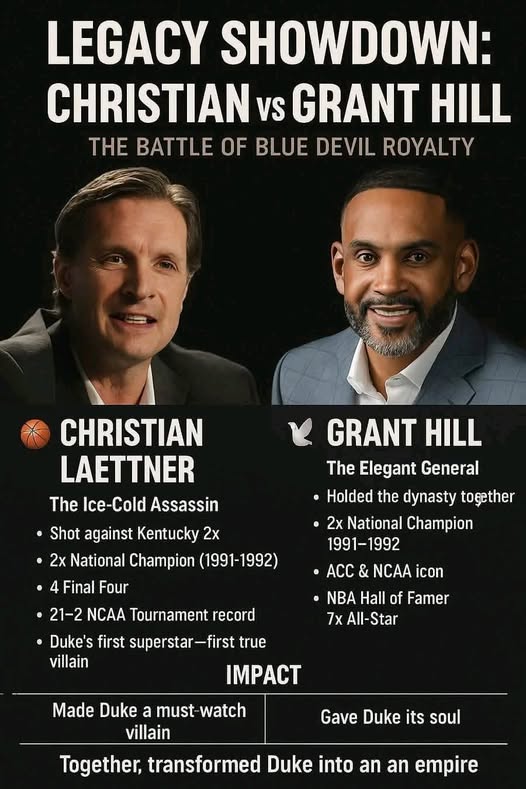Christian Laettner vs. Grant Hill: A Legacy Showdow
Duke University’s basketball program stands as one of the most storied and successful in NCAA history. For decades, the Blue Devils have been a perennial powerhouse, consistently competing for national championships and producing NBA talent. Central to this success are two of the most iconic players in Duke’s history: Grant Hill and Christian Laettner. Though their careers overlapped in the early 1990s, their legacies provoke debate among fans and analysts alike. Who truly built Duke’s basketball empire? Was it the smooth, versatile and charismatic Grant Hill, or the clutch, fierce and relentless Christian Laettner?
This legacy showdown explores their contributions on and off the court, examining the context of their eras, their playing styles, leadership qualities, and long-term impact on Duke basketball. The answer might surprise many: it was a combined effort, but one player’s legacy is often overshadowed by the other’s. Let’s dive deeper.
Before Grant Hill and Christian Laettner donned the Duke blue, the program had tasted some success, particularly under legendary coach Mike Krzyzewski, who took over in 1980. Early in Coach K’s tenure, Duke struggled to find consistent national relevance, but by the late 1980s, the program was improving, making NCAA tournament appearances but falling short of true national championship contention.
Hill and Laettner entered Duke at pivotal moments:
- Grant Hill joined Duke as a freshman in 1990.
- Christian Laettner, already a freshman at Duke in 1988, was a seasoned player by the time Hill arrived.
Together, they propelled Duke into a new era of national dominance, but their paths and styles could not have been more different.
Grant Hill was a rare talent — a 6-foot-8 forward with the ball-handling skills of a guard, the shooting touch of a sniper, and the athleticism to excel in transition. His style was smooth, effortless, and highly versatile. Hill could score inside and outside, defend multiple positions, create for teammates, and run the floor like few forwards could.
His game had a natural elegance, marked by highlight-reel dunks and graceful drives to the basket. Hill’s vision and basketball IQ set him apart, making him one of the best all-around players in college basketball history.
Hill’s three-year tenure at Duke (1990-1994) was marked by consistent excellence:
- He was a two-time Consensus First-Team All-American.
- Named ACC Player of the Year twice.
- Two-time NCAA runner-up (1992 and 1994).
- Averaged around 16 points, 8 rebounds, and 4 assists per game in college.
- Integral to Duke’s back-to-back national championship runs (1991, 1992).
Hill’s leadership on and off the court helped set the tone for Duke’s culture — emphasizing discipline, teamwork, and a winning mentality.
Off the court, Grant Hill was charismatic and media-friendly, helping elevate Duke’s national profile. He became the face of the program in the early 90s and helped attract future talent. Hill was not just a great player; he was an ambassador for Duke basketball, promoting the program’s academic values alongside athletic success.
Christian Laettner’s game contrasted with Hill’s elegance; it was defined by competitiveness, toughness, and clutch performance. Standing 6-foot-11, Laettner combined size, shooting ability, and basketball IQ with a killer instinct unmatched in college basketball history.
Laettner was a dominant post player, but also an excellent shooter with range extending to the three-point line — rare for big men of his era. His fundamental skills were near perfect, and he had an uncanny ability to take over games in critical moments.
Laettner’s legacy is synonymous with clutch moments and incredible achievements:
- Played four years at Duke (1988-1992), the only player to do so under Coach K during this era.
- Led Duke to two NCAA championships (1991, 1992).
- Most famously known for his buzzer-beater in the 1992 East Regional Final against Kentucky — one of the greatest plays in NCAA history.
- Two-time NCAA Final Four Most Outstanding Player.
- All-time leading scorer in Duke history.
- The only college player to start on four Final Four teams.
- Named consensus first-team All-American three times.
Laettner’s relentlessness in the paint and clutch gene became the embodiment of Duke’s killer mentality on the court.
Laettner was a polarizing figure, often considered arrogant by opponents but respected by teammates and coaches. His on-court achievements made him the face of Duke’s basketball excellence in the early 90s, reinforcing the program’s image as a basketball powerhouse capable of winning titles and dominating under pressure.
Both players contributed significantly to Duke’s championships. Hill played on two championship teams (1991, 1992) and Laettner was on all four Final Four teams Duke reached during his four years, winning two titles. Laettner’s durability and clutch moments arguably had a more direct impact on those championships, especially his iconic shot against Kentucky.
However, Hill’s leadership and all-around play set the stage for those teams’ successes. The two complemented each other perfectly: Hill’s versatility with Laettner’s inside dominance.
- Laettner: Multiple NCAA Final Four Most Outstanding Player awards, all-time Duke scoring leader.
- Hill: ACC Player of the Year, All-American honors, future NBA star.
Both were dominant in college, but Laettner’s four-year career gave him a statistical edge, while Hill’s shorter tenure showcased extraordinary talent that would transition to the NBA.
Grant Hill was known as the consummate leader — calm, poised, and steady. He helped build a winning culture that endured beyond his playing days and elevated the program’s reputation nationally.
Laettner, on the other hand, was the fiery competitor. His will to win and clutch performances made him the embodiment of Duke’s competitive spirit, inspiring teammates and intimidating opponents.
While the focus is on their Duke legacies, their professional careers also shaped perceptions.
Hill’s NBA career began with promise, and for a time, he was considered the best all-around player outside of Michael Jordan. Injuries derailed his peak years, but Hill’s longevity and impact remained substantial. His NBA success helped keep Duke in the spotlight nationally.
Laettner had a solid but less glamorous NBA career. He was a reliable contributor but never reached the superstar heights he attained in college. His NBA legacy is more subdued compared to Hill’s.
The truth is the Duke basketball empire was not built by a single player. It was a combination of factors, including Mike Krzyzewski’s coaching genius, Hill’s leadership and versatility, and Laettner’s clutch dominance.
- Hill built the foundation — his leadership, charisma, and all-around skill helped elevate Duke’s brand nationally.
- Laettner carried the crown jewels — his clutch performances and consistency translated into championships and lasting memories.
If one had to pick, Christian Laettner’s legacy as the most impactful Duke player of that era on the court is undeniable. He represents the heart of Duke’s basketball identity: toughness, execution under pressure, and relentless pursuit of excellence.
However, Grant Hill’s contributions off the court and his role in building the program’s culture and national profile were equally vital.
Christian Laettner vs. Grant Hill is not just a comparison of two players; it is a study of what builds a basketball dynasty. Both players were essential in shaping Duke’s modern basketball empire, each contributing uniquely to its success.
Hill was the elegant pioneer, the ambassador of Duke basketball’s rise to national prominence. Laettner was the ruthless closer, the player whose moments of greatness defined Duke’s golden era.
Together, they crafted the foundation and built the palace of Duke basketball — a legacy that continues to inspire players, fans, and the sport itself.



